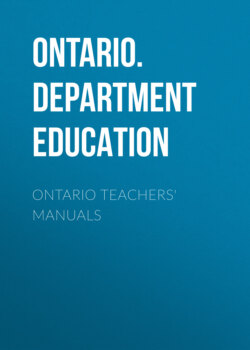Читать книгу Ontario Teachers' Manuals - Ontario. Department of Education - Страница 22
На сайте Литреса книга снята с продажи.
BRITISH HISTORY
ОглавлениеA
A Course of about Two Months
The Early Inhabitants—The Britons
The Coming of the Romans
The Coming of the Saxons
The Coming of Christianity
Alfred the Great
The Coming of the Normans—The Feudal System
Richard I and the Crusaders
John and Magna Charta
The Scottish War of Independence
The Hundred Years' War—Crecy, Agincourt, Joan of Arc.
The Wars of the Roses (no lists of battles or details of fighting)
Caxton and Printing
Separation between the English Church and Rome
B
A Course of about Eight Months
Brief account of the British Isles, territorial, political, and religious, as an introduction to the reign of Elizabeth.
Elizabeth and Mary Queen of Scots; the Spanish Armada; Drake, Hawkins, Gilbert, Raleigh, Shakespeare.
The Stuarts: "Divine Right of Kings" supported by majority of gentry and landowners (cavaliers), opposed by the commercial and trading classes and yeomen (roundheads). The Kings strove for absolute power, the Parliament for constitutional government.
James I: Union of the English and Scottish Crowns.
Charles I: Struggle between King and Parliament; Petition of Right, Ship Money, rebellion, execution of Charles.
Commonwealth: nominally a republic, really a dictatorship under Cromwell. He gave Britain a strong government at home, and made her respected abroad, and laid the foundations of Britain's foreign trade and colonial empire.
Charles II: The Restoration: Reaction in state, church, and society; King striving for absolute power; Nonconformists persecuted; society profligate in its revolt against the strictness of Puritanism; Habeas Corpus Act; Test Act; Plague and Great Fire.
James II: Revolution of 1688, the death-knell of "divine right"; Parliament supreme; Declaration of Rights.
William and Mary: Party government—Whigs and Tories; King to act by advice of his ministers; each parliament limited to three years; Bill of Rights; Act of Settlement.
Anne: Marlborough; Union between England and Scotland, 1707; the Jacobites, 1715 and 1745.
George II: Walpole, the great peace minister—home and colonial trade fostered and material wealth of the nation greatly increased; Pitt, the great war minister; territorial expansion in Canada and India—Wolfe, Clive; the Methodist Movement, Wesley.
George III: The American Revolution, 1776–83: loss of the American Colonies; Pitt; Washington; acquisition of Australia by Great Britain, 1788; legislative union of Ireland with Great Britain, 1801; Napoleonic wars; Nelson, Wellington, Aboukir, Trafalgar, and Waterloo; industrial revolution—the change from an agricultural to an industrial country.
William IV: Reform Act of 1832, a great forward movement in democratic government; abolition of slavery, 1833; railways and steamships.
Victoria: First British settlement in New Zealand, 1839; Repeal of the Corn Laws, 1846—free trade, the commercial policy of England; Elementary Education Act, 1870, education compulsory; parliamentary franchise extended—vote by ballot; Crimean war; Indian Mutiny; Egypt and the Suez Canal; Boer War—Orange Free State and South African Republic annexed; social progress.
Edward VII: Irish Land Act of 1903; pensions for aged labourers; King Edward, "the Peace-maker."
Civics
Taxation—direct and indirect; how the revenue of the Dominion, provinces, and municipalities, respectively, is collected.
Federal Government—Governor-general, Senate, House of Commons, Premier, Cabinet.
Imperial Government—King, House of Lords, House of Commons, Premier, Cabinet.
